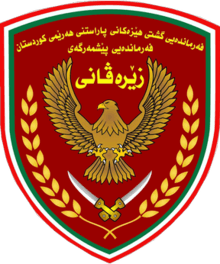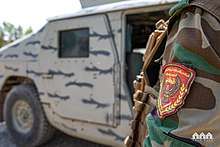Zeravani
The Zerevani[4] (Kurdish: زێرەڤانی, Zêrevanî) (or Zeravani,[5] sometimes Zeravani Army[6]) are the militarized police force (described as a gendarmerie by some[5]) are operated by the Kurdistan Regional Government of Iraq.
| Peshmerga Zerevani | |
|---|---|
| Kurdish: زێرەڤانی, Zêrevanî | |
 Zeravani logo | |
| Active | 1997–2006 (as Kurdish forces)[1] 2006-present (Kurdistan Regional Government) |
| Country | Iraqi Kurdistan |
| Allegiance | Kurdistan Regional Government |
| Branch | Peshmerga |
| Role | Gendarmerie of Iraqi Kurdistan |
| Size | 51,000–120,000 active 250,000 reservists[2][3] |
| Garrison/HQ | Zakho |
| Nickname(s) | Zerevani |
| Engagements | Iraqi Civil War |
| Commanders | |
| Commander | Major General Aziz Weysi Bani |

Organization and Mission
The Zeravani are under the operational control of the Kurdish Ministry of the Interior[1][7] but are a part of the Peshmerga (armed forces), and provide security for government and industrial property and support to civilian police & the military.[6][8] The first Commanding Chief of Zerevani was Faridun Jwanroyi, Fraydoon resigned in 2010 and Aziz Weysi Bani was assigned as the Major General of the Zerevani.[7]
The Zeravani were established in 1997 by the KDP in order to support the police and Asaysh forces; according to Major General Aziz Waisi, the Zeravani's role over the years expanded to also protect electricity stations and water resources,[1] as well as embassies, consulates, government offices and other sensitive targets.[9]
According to Stratfor, as of 2004 two Zeravani divisions (totaling 30,000 troops) were established in the Iraqi Federal Police.[10] In 2011, the Zeravani strength was of 47,000,[1] while as of 2017, Zeravani strength is of 51,000;[11][12] among these, there are several Iraqi Christians.[13]
Zeravani accepts recruits aged between 18 and 27. They need to provide an Iraqi national ID and food coupons, to be literate, to have a clean record and a recommendation in terms of moral and loyalty issues;[1] women are allowed to serve.[9]
Issues
In June 2008, the Zeravani were the subject of an Amnesty International campaign after the alleged kidnap of a Kurdish journalist.[8] According to Canadian website McLeans.ca, the Zeravani are considered loyal to the ruling Kurdistan Democratic Party;[7] according to Major General Aziz Waisi, all political activities are forbidden within the Zeravani, although party membership is allowed.[1]
International training and operations
In November 2009, the Zerevani began training conducted alongside the Iraqi Federal Police,[4] in order to conduct effective police work and counter-insurgency operations.[14] Since 2014, also the Zeravani have undergone training with the Combined Joint Task Force – Operation Inherent Resolve. The Zerevani training is conducted primarily by the Italian Carabinieri,[14] but also by Canadian,[7] British, German, Dutch, Norwegian, Finnish and Hungarian forces.[14] As of 2016, the Zerevani were also trained by Italian Army[15]
A Zeravani division led by Colonel Abu Rish was fighting against ISIS near Mosul during summer 2015;[16] in 2016 the Zeravani, according to Colonel Abdularrahman Hassan, still occupied frontline positions around Mosul.[7]
Current equipment of the Peshmerga
Because Zerevani forces were low on equipment when they began training, the Peshmerga army donated some of their weapons to the Zerevani. The Kurdistan Regional Government set them up a base and allowed them to buy their own weapons. They are usually armed with AKMs, RPKs (light Soviet machine guns) and DShKs (heavy Soviet machine guns). Some Zervani companies are however armed with American rifles ( M4A1 and M16 )
- Individual Weapons
- Assault Rifle
- AKM (Assault Rifle – 7.62×39mm)
- Zastava M92 (Assault Rifle – 7.62×39mm)
- AK-74 (Assault Rifle – 5.45×39mm)
- Heckler & Koch G3 (Battle Rifle – 7.62×51mm)
- M16 (Assault Rifle – 5.56×45mm)[17]
- M4A1 (Assault Rifle/Carbine – 5.56×45mm)
- Sniper Rifle
- SVD Dragunov (Sniper Rifle – 7.62×54mmR)
- M-40A1 (Sniper Rifle – 7.62×51mm)
- Barrett M82A1 (Sniper Rifle – 12.7×99mm)
- Tabuk Sniper Rifle (Sniper Rifle – 7.62×39mm)
- M-24 SWS (Sniper Rifle – 7.62×51mm )
- Dragunov SVU (Sniper Rifle – 7.62×54mmR)
- Zastava M91 (Sniper Rifle – 7.62×54mmR)
- PSG1 (Sniper Rifle – 7.62×51mm)
- Anti-Tank Explosive
- Assault Rifle
- Vehicles
- Main Battle Tank
- Military trucks
- Pickup trucks
- Toyota Hilux (4×4 "4Runner")
- Nissan Titan
- Defender-110[21]
- Anti-Aircraft Gun
References
- "Commander of the Zeravani Peshmarga Forces, Maj. Gen. Aziz Waisi, sheds light on the role and future of Zeravani forces". Kurdish Globe. Free Online Library. June 25, 2011. Retrieved May 11, 2017.
- Dortkardes, İhsan (July 20, 2007). "Barzani: Düzenli ordu yakında". Milliyet (in Kurdish). Retrieved June 6, 2008.
- Willing to face Death: A History of Kurdish militia Forces – the Peshmerga – from the Ottoman Empire to Present-Day Iraq Archived October 29, 2013, at the Wayback Machine, Michael G. Lortz
- "Kurdish Zerevani and Arab Policemen Graduate Training and Break Down Barriers". NATO Training Mission-Iraq. December 11, 2009. Retrieved January 3, 2010.
- "A hint of harmony, at last". The Economist. December 3, 2009. Retrieved January 3, 2010.
- Khidhir, Qassim (February 27, 2007). "Zeravani Army is guardian of Kurdistan Region Capital". The Kurdish Globe. p. 16. Retrieved January 3, 2010.
- Khan, Adnan R. (May 5, 2016). "Inside the secret war in Iraq". Macleans.ca. Retrieved May 11, 2017.
- "Archived copy". Retrieved January 3, 2010.
- "Le soldatesse italiane addestreranno le colleghe curde". Il Tempo (in Italian). May 30, 2016. Retrieved May 11, 2017.
- "Special Series: Security in Iraq After the U.S. Withdrawal". Stratfor. Retrieved May 19, 2017.
- "Over 150,000 enlisted as Peshmerga troops in Kurdistan Region, official data shows". Rudaw. April 3, 2017. Retrieved May 11, 2017.
- Bussoletti, Francesco (April 3, 2017). "Iraq, Isis deve combattere contro un esercito di oltre 150.000 Peshmerga". Difesa e Sicurezza (in Italian). Retrieved May 11, 2017.
- Lombardi, Daniela (December 15, 2016). "Croce e fucile, le armi dei cristiani iracheni contro il Daesh". Gli occhi della guerra (in Italian). Gli Occhi della Guerra. Retrieved May 11, 2017.
- Giuliani, Eleonora; Ames, Justin (March 27, 2017). "Mosul Needs 35,000 Cops". War is Boring. Retrieved May 19, 2017.
- "Kurdistan iracheno: addestramento degli Zeravani". www.difesa.it (in Italian). January 22, 2016. Retrieved May 11, 2017.
- News, Vice (June 11, 2015). "Cutting The Islamic State's Supply Lines: The Road To Mosul". VICE NewsGlobe. Retrieved October 28, 2016.
- U.S. Department of Defense, Measuring Stability and Security in Iraq (June 2007) p.30, p.39 p.30
- Middle East Military Balance Archived August 24, 2008, at the Wayback Machine
- Iraq’s T-72s: Payment Received
- Holdanwicz, Grzegorz. "Iraqi armed forces get armoured vehicles". Jane's Defence Weekly
- Shapir, Yiftah S., Middle East Military Balance, Tel Aviv University, 6, 7 Archived August 24, 2008, at the Wayback Machine